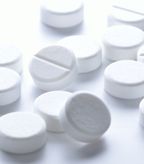Meta-Analysis: Acetaminophen, NSAIDs, Increase Risk for Kidney Cancer
Acetaminophen and nonaspirin nonsteroidal anti-inflammatory drugs were associated with a 28% increased risk of developing kidney cancer, according to the results of a recently published meta-analysis.
Acetaminophen and nonaspirin nonsteroidal anti-inflammatory drugs were associated with a 28% increased risk of developing kidney cancer, according to the results of a recently published meta-analysis.

The study, which was published in the International Journal of Cancer, included the results from 20 studies performed in six countries that were inclusive of more than 8,000 kidney cancer cases.
“Use of certain analgesics, including aspirin and nonaspirin nonsteroidal anti-inflammatory drugs, has been associated with reduced risk of breast, prostate, and colorectal cancer,” the researchers wrote in the article. “The effect of these analgesics on RCC is less clear.”
The researchers gathered data from studies of the three most commonly used analgesics that were published through June 2012. Studies included in the analysis had to have focused clearly on renal cancer or kidney cancer, as well as include relative risk (RR) estimates with confidence intervals.
When isolating the results for acetaminophen, an increased risk for kidney cancer was identified with regular or any use (pooled RR = 1.28; 95% CI, 1.15–1.44). A stronger association between acetaminophen and kidney cancer was found with higher intake (RR = 1.68; 95% CI, 1.22–2.30), though not with extended use (RR = 1.16; 95% CI, 0.84–1.59).
An increased risk for kidney cancer was also found with regular use of nonaspirin NSAIDs (RR = 1.25; 95% CI, 1.06–1.46). Similar to acetaminophen, risk was further increased with higher intake (RR = 1.56; 95% CI, 1.11–2.19).
“This finding may have some public health consequences since these analgesics are the most commonly used group of over-the-counter drugs, and some of them have been associated with reduced risk of several major cancer sites,” the researchers wrote. “Although kidney cancer is relatively rare, risks and benefits should be considered in making decisions of using these analgesics.”
In contrast, the researchers found that regular use of aspirin was not significantly associated with an increased risk for kidney cancer (RR = 1.10; 95% CI, 0.95–1.28). Although trends were seen toward increased risk with increased intake or duration of use, they did not reach statistical significance.
“It is unclear why aspirin can have established protective effect against colorectal cancer, for example, but not in kidney cancer,” the researchers wrote. “After all, the proposed mechanisms of aspirin on cancer prevention through reducing inflammation, inhibiting cyclooxygenase-2, and inducing apoptosis of cancer cells, are not considered to be tissue-specific. However, it is possible the mechanisms that induce colon carcinogenesis are quite different from renal carcinogenesis.”
The researchers mentioned several limitations to their study in the discussion of the results, including the fact that some of the studies included did not adjust for potential risk factors for renal cancer. In addition, several studies included multiple cancers of the kidney, including renal cell carcinoma, but also renal pelvic or ureteral cancers. Finally, the studies used different definitions for analgesic use and may not have taken into account when participants changed the type of analgesic being used.